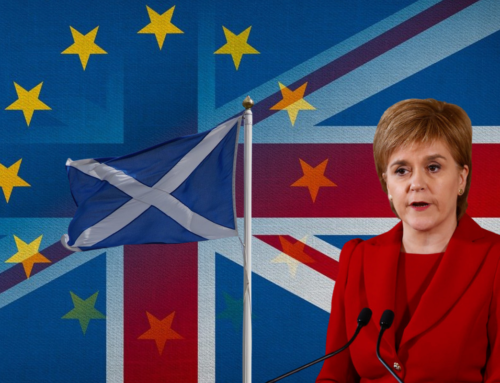by Brendan Donnelly
Director, The Federal Trust
3rd March 2018
After her speech yesterday about the Brexit negotiations, the Prime Minister was asked by a German journalist whether she thought Brexit was worth all the effort and disruption it entailed. Although British withdrawal from the EU is probably the most important national decision taken since the Second World War and it will inevitably define the success or otherwise of Mrs. May’s Premiership, she was unable or unwilling to answer this question. Instead, she answered a different question. There was no chance, she said, of the United Kingdom’s changing its mind on this issue. For Mrs. May, in the same way as Brexit means Brexit, the UK is leaving the European Union because it is leaving the European Union. Reflections about whether this is a desirable or rational course of action are beyond her pay grade.
The German reporter’s question was one arising naturally from the Prime Minister’s speech. She had begun it with a recognition that Brexit would inevitably act as a brake upon trade in Europe. It is a reminder of the frequently delusional nature of the British debate on Europe that it should have taken her nearly two years as Prime Minister before she could bring herself to make this obvious admission. Mr. Barnier and Mr. Tusk will be entitled to feel some satisfaction that Mrs. May has eventually come to accept what they have been saying for many months, namely that frictionless trade between the UK and the EU after Brexit is a chimera. In essence, the Prime Minister’s speech is best regarded an elaborate set of reflections on how future friction might be reduced. These reflections are of their nature a mixed bag. Some of her proposals may well be achievable, such as continued British participation in European agencies; others, such as voluntary regulatory alignment by the UK with some economic sectors of the European Union, will be deeply unattractive to the European partners.
Reading between the lines
Whatever the merits of her individual suggestions, two underlying themes emerge from the plethora of Mrs. May’s proposals for limiting the economic damage of Brexit. These proposals are wide-ranging, bureaucratic, complicated and will take many years to agree, if indeed they ever can be agreed. They do however represent a negotiating agenda recognizably that of a third country seeking a Free Trade Agreement (FTA) with the European Union. FTAs, as is well known, take many years to negotiate and agree. There is therefore no chance whatsoever that an agreement along the lines adumbrated by Mrs. May can be concluded by the end of the transition/standstill period until December 2020 which the EU seems willing to grant the UK. The second implicit (but not explicit) theme of the speech is that the raft of Mrs. May’s proposals is clearly designed to minimize the economic damage done to the UK by Brexit by attempting to recreate as far as possible the UK’s existing membership of the EU, without being a member of the internal market, without being a member of the Customs Union and without accepting the direct jurisdiction of the European Court of Justice. The UK’s European partners will understandably regard this as “cherry-picking”. Another, sadder interpretation is however possible.
The whole of Mrs. May’s speech is an implicit recognition that Brexit has the real potential to inflict disastrous economic and political damage on the United Kingdom. To minimize the risk of this disaster, the British state is condemned to many years of back-breaking negotiations with possibly unsympathetic partners to create an elaborate network of regulatory alignments, mutual recognitions, agency memberships, legal consultations, sector-specific arrangements and parallel standard-setting. This work will take a period certainly comparable to that taken to negotiate the Free Trade Agreement with Canada and probably longer. It will for many years to come dominate the administrative and political resources of the British state, and may well create severe regional and constitutional tensions within that state. The end-state of these negotiations is in its details unpredictable, but its most favourable conceivable outcome is an economic relationship with the EU noticeably less favourable than the one now enjoyed by the United Kingdom. The relative realism of the Prime Minister about the disadvantages of Brexit at the beginning of her speech failed her when she spoke of “neither side getting all they want” in the Brexit negotiations. It has been a recurrent wishful aspiration of the British side in these talks to view them as an exchange between equals. This is far from being the case. The European Union holds almost all the negotiating cards. It can confidently be predicted that the final result of the Brexit negotiations will fall well short even of the now reduced and adjusted expectations of the Prime Minister.
Her German interrogator had obviously been listening harder to Mrs. May’s speech than had her British colleagues. The conclusion is unavoidable from a careful reading of her words that the Prime Minister well realizes what self-harming nonsense Brexit is, but is politically and personally too weak to do anything about it beyond speculative attempts at mitigation. It is moreover worth stressing just how speculative these attempts at mitigation are. At least three problems remain every bit as intractable for Mrs. May after her speech as they were before. They are the Irish border, the reaction of her European partners to her proposals and the reaction of her Parliamentary Party.
Unsolved difficulties
Essentially, the Prime Minister’s speech left intact the irresoluble conundrum of the Irish border. Her colleagues in Dublin will have welcomed the conciliatory tone of her remarks on the subject, but the Irish Prime Minister has continued to express his doubts about Mrs. May’s vaguely formulated solutions to this dilemma. There is more than a suspicion in the Irish press and political opinion that the UK hopes by leaving this issue unresolved for as long as possible to put pressure on the Irish government, which would be a particular sufferer if the United Kingdom left the EU without an agreement of any kind. Some British commentators have predicted an eventual diminution of European support for the Irish government as the second phase of the Brexit negotiations progresses. This is to underestimate the resolution of the Irish government and the solidarity with it of the rest of the EU against a member state that has decided to leave. The question of the inner Irish border is one that is still entirely capable of preventing any movement to the second phase of the Brexit negotiations and even in the second phase of preventing any progress towards eventual consensus between the EU and the UK.
As the Brexit negotiator on behalf of the EU member states, Mr. Barnier welcomed the “clarity” arising from Mrs. May’s speech. His welcome was however formulated in such a way as to give the Prime Minister pause. He made no reference to her more detailed proposals for the economic mitigation of Brexit. He simply noted her clear statement that the United Kingdom will be leaving the single market and the Customs Union. It is well known that Mr. Barnier and most of the member states, crucially including France and Germany, regard British self-exclusion from the customs union and the internal market as precluding any future arrangement between the EU and the UK other than one based on the Canadian Free Trade Agreement. Mr. Barnier’s guarded welcome for Mrs. May’s speech probably reflects little more than his relief that he will not need in the light of it to suggest any changes to the Council’s proposed Brexit guidelines due to be published next week. These guidelines will almost certainly make clear that for the EU British absence from the single market and the Customs Union represents an insoluble barrier to the sort of “deep and special” relationship of which Mrs. May has often spoken. The minimalist Canadian Free Trade Agreement is likely to be the starting-point for the Council guidelines and Mrs. May’s speech has almost certainly come too late to make any significant difference to these guidelines.
The probable unforthcoming tone of the Council guidelines will exacerbate Mrs. May’s final problem, that with her Parliamentary Party. The willingness of the most radical Eurosceptics within her own party to tolerate Mrs. May’s concessions on the European budget and on the continuing rights of EU citizens living in the UK was always dependent upon the fantasy, which Mrs. May encouraged, that a general arrangement favourable to the UK for EU/UK trade could be agreed well before March 2019. The Prime Minister’s speech of yesterday by implication and the Council’s guidelines more directly will combine to put an end definitively to this misconception. In the same way as her own Parliamentary Party became progressively more uneasy about the implications of the Florence speech last year, it can confidently be expected that Mrs. May’s Conservative party will come more and more to question what it will regard as her “concessions” of yesterday, “concessions” that are unlikely to meet with the hoped-for enthusiastic welcome from the UK’s European partners. Mrs. May’ speech of yesterday has perhaps achieved for a few days, even a few weeks, acquiescence from her fractious party. The chances of this acquiescence’s being long-lasting are remote in the extreme.
An uncertain future
The Chairman of the EPP Group in the European Parliament, Manfred Weber, has commented that he is more pessimistic about the possibility of a consensual Brexit after Mrs. May’s speech than he was before. This is a curious reaction. The chances of a non-consensual Brexit remain exactly where they were before the speech. The United Kingdom continues to find itself in the bizarre situation that it is pursuing as its most important national and political preoccupation a goal, namely Brexit, which most of those closely involved (including the Prime Minister) know to be profoundly against the national interest. This schizophrenia will over time express itself in various ways, of which Mrs. May’s most recent speech is simply the latest manifestation. It is indeed questionable whether any agreement can be achieved this year on the precise terms of British withdrawal from the EU and a more general template for trade relations between the two parties. Mrs. May’s speech of yesterday is however no more than the latest symptom of the dreaded disease which is Brexit. As a symptom, it can make little or no difference to the eventual prognosis for the stricken British patient.








[…] Source: Is Brexit worth it, Prime Minister? | The Federal Trust […]
[…] http://fedtrust.co.uk/is-brexit-worth-it-prime-minister/ […]